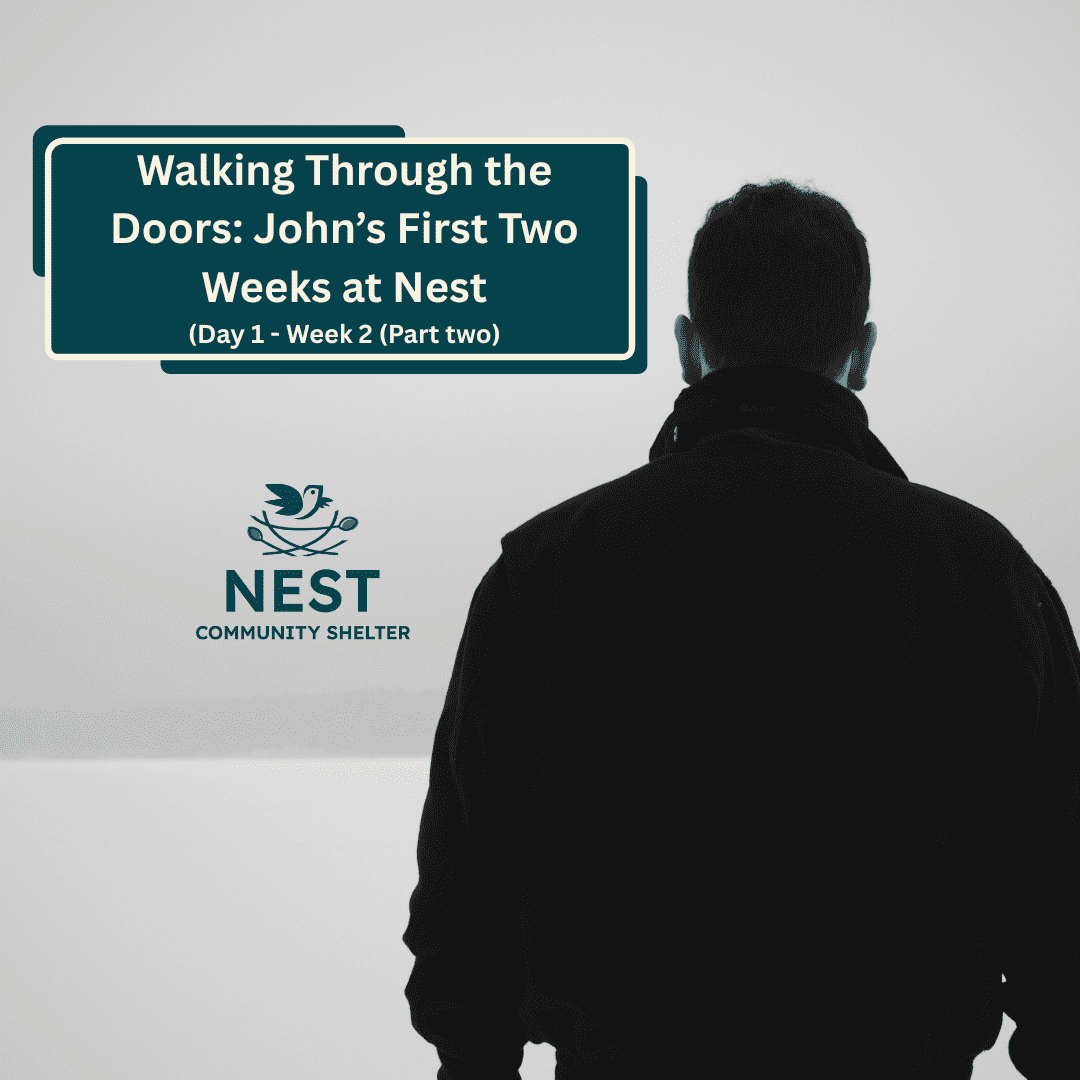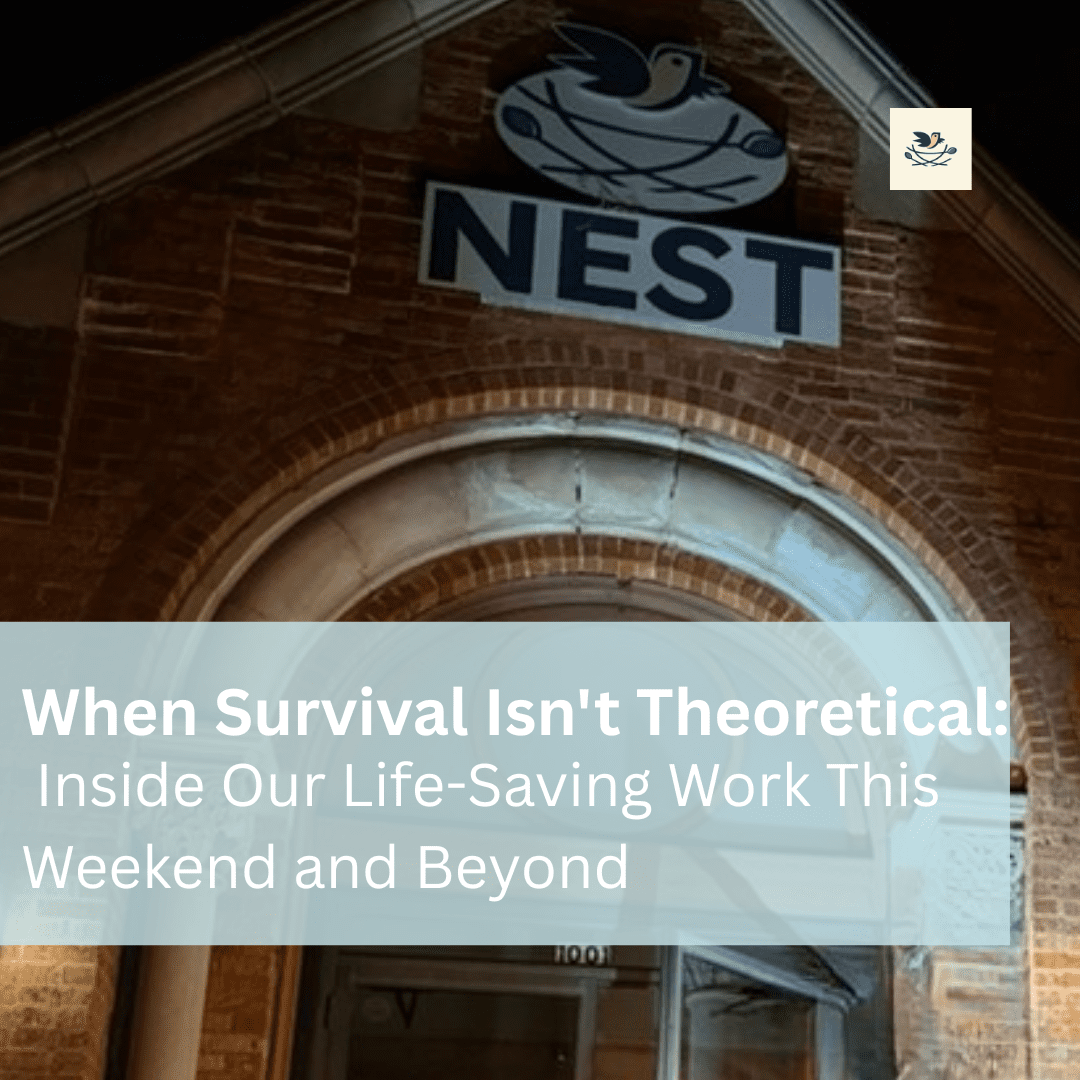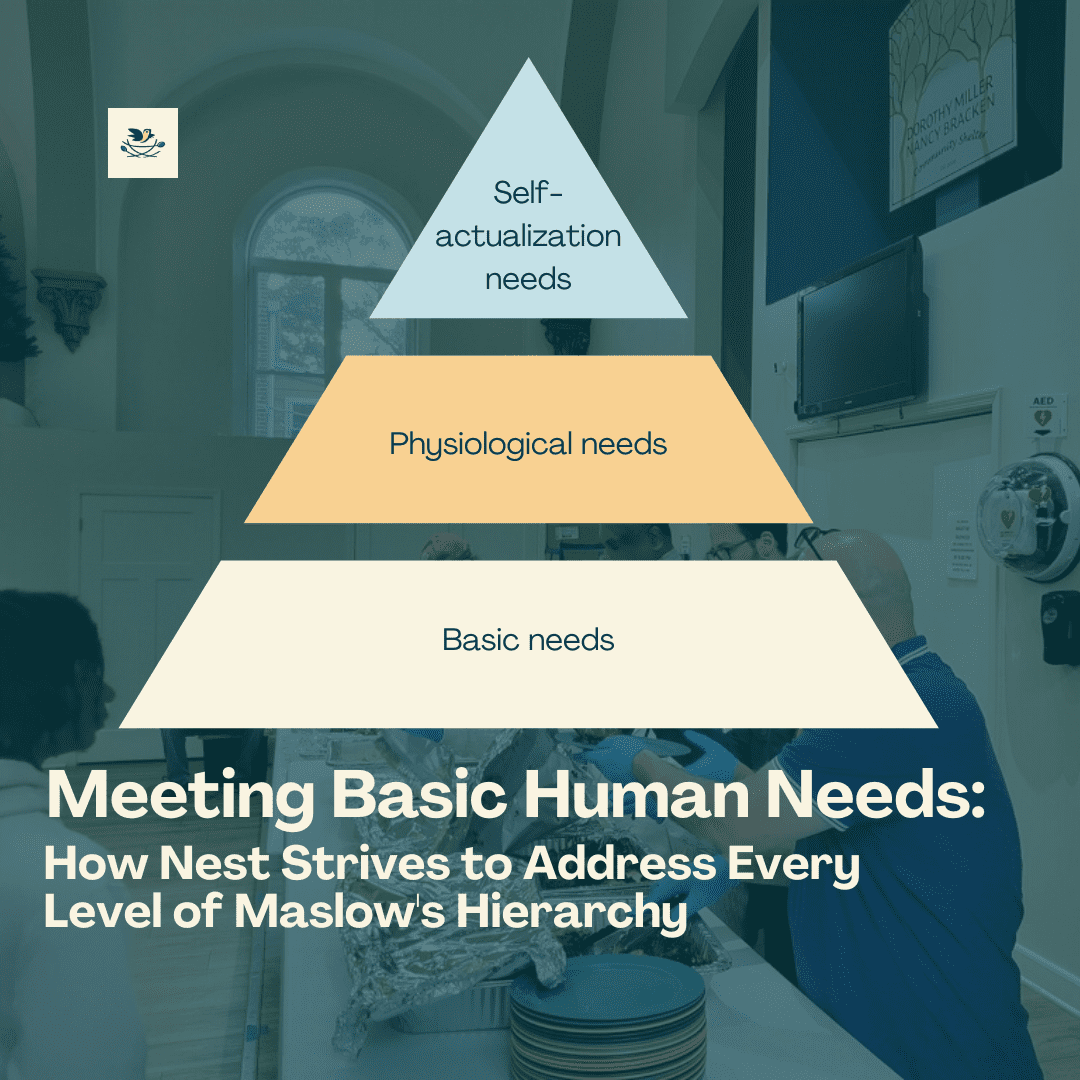
This is a fictionalized guest’s perspective on walking through the Nest Community Shelter program from day one up to week 2. Please keep in mind that while this account is totally fictional, many of the themes of John’s story are ones that we see daily, regardless of age or sex. This is the first post in a series from the guests’ perspective of what it is like to walk through the Nest program. Earlier this week, we shared an overview of what the first two weeks in our program entail. As September progresses, we will share one blog post each week from a program perspective, and then John’s account of what it is like to walk through the Nest program to build a greater understanding of how our shelter works, the partnerships we have, and how we support our guests on their journey to stable housing.
Meet John
My name is John, and two weeks ago, I never imagined I’d be writing about my experience staying at Nest Community Shelter. If someone had told me six months ago that I’d be sleeping in a dormitory-style room with strangers, eating meals I didn’t cook, and storing all my possessions in a plastic tote nightly, I would have laughed. But life has a way of humbling you faster than you ever thought possible. I’ve been a lifelong Michigan City resident, and I knew the shelter existed, but I never imagined it would be somewhere I’d temporarily call home. Here is where my story and my journey with Nest begin.
Day One: Crossing the Threshold
I still remember standing outside Nest Community Shelter that first evening, staring at the doors and trying to work up the courage to walk through them. I’d called ahead earlier that day, my pride fighting every digit I dialed, but the person on the phone had been kind, asking about any special needs I might have and answering my nervous questions about what to expect. They confirmed that I’d have a place to stay tonight if I showed up. I was still uneasy about all of this. I’d been okay living in my car, but with the weather turning from cold to frigid, I needed another place to sleep. When the car got towed for being illegally parked, I lost my home and my car.
When the doors opened for the evening, I took what felt like the longest walk of my life. Those few steps across the threshold might as well have been miles. This was it, the moment I had to admit to myself and the world that I needed help. I wasn’t “making it” or “getting by” any longer on my own. I’ve never been good at asking for help and even worse at taking it.
But something unexpected happened. Instead of judgment or pity, I was met with warmth. The staff member who greeted me smiled genuinely and said, “Welcome to Nest. We’re glad you’re here.” In that moment, some of the shame I’d been carrying started to lift, just a little.
The health screening came next, a standard procedure, they explained, to ensure everyone’s safety in the shared living space. I appreciated that they treated it matter-of-factly, not making me feel like I was diseased or dangerous. Just practical care for everyone under their roof.
Then came the tote. Twenty-seven gallons, that’s what my life had been reduced to. The staff member handed it to me with bedding inside: clean sheets, a blanket, and a pillow. Such simple things, but after weeks of uncertainty about where I’d sleep each night, they felt like luxury. I found an available bed, a simple mattress on the floor, but I was grateful. I made it up and put my few possessions in the tote. Everything I owned in the world, fitting into a plastic container.
The Meeting That Changed Everything
After I’d settled in, a case manager approached me. “When you’re ready,” she said, “I’d like to sit down and talk with you about your situation and how we can help.”
I won’t lie, I was terrified of that conversation. Admitting out loud how I’d ended up here, laying bare all the way my life had unraveled, felt like ripping off a bandage that hadn’t even begun to heal. But she had this way of listening that didn’t make me feel judged. She asked about my challenges, yes, but she also inquired about my strengths, goals, and what I wanted my life to look like.
We talked about practical things: Did I have ID? Social Security card? Birth certificate? The answer was mostly no. It’s amazing how quickly you can lose track of essential documents when your world is falling apart. Was I working? Did I have any savings? Did I qualify for assistance programs I’d never even heard of?
But we also talked about bigger things. What had led me here? What obstacles did I need to overcome? What support would help me get back on my feet? For the first time in months, someone was asking me not just about my problems, but about my plan to solve them.
By the end of that conversation, I had something I hadn’t had in a long time: a roadmap, or at least the beginning of one. It wasn’t going to be easy, and it wasn’t going to be quick, but there was a path forward.
Finding Solid Ground
After our meeting, I joined the other guests for dinner. The food was hot, filling, and served with dignity. No one made me feel like a charity case. We were just people sharing a meal. Everyone who served dinner that night did so in kindness and with a smile.
That first night’s sleep was strange. Part of me felt exposed, vulnerable in a room full of strangers. But another part of me felt something I hadn’t experienced in weeks: safety. I didn’t have to worry about someone knocking on my window to move my car, or the weather, or where I’d be the next night. For the first time in too long, I could actually rest.
Building Toward Tomorrow
The next morning began what would become my daily routine over the following two weeks. I met regularly with my case manager and a Flight School instructor, dedicated volunteers who genuinely seemed invested in helping me succeed. They helped me navigate systems I’d never had to deal with before, connecting me with community resources and scheduling appointments I needed.
Getting my documents replaced became priority number one. You don’t realize how much you need a driver’s license or Social Security card until you don’t have them. Try getting a job or renting an apartment without proper ID; it’s nearly impossible. But the Nest staff knew exactly who to call and where to go. They’d done this before, many times.
We also worked on my immediate needs. I’d been working part-time, but it wasn’t nearly enough to afford rent anywhere. The staff connected me with programs that could help bridge that gap, and we started exploring longer-term employment options that could provide more stability. They positioned me to be ready for the next steps in my journey.
The Unexpected Gift of Community
One of the most surprising things about these first two weeks was the friendships that began to form. I’d expected the other guests to be… I don’t know, different somehow. Dangerous or unstable. Instead, I found people like me, folks who’d hit a rough patch and were working to get back on their feet.
There was Maria, a single mom whose hours had been cut at work. There was Robert, a veteran dealing with health issues that had derailed his career. There was Beth, who’d aged out of the foster system without a support network. All of us are different, all of us are struggling, but all of us are helping each other in small ways. All local residents, that the world chose not to see, but Nest welcomed with open arms.
These connections matter more than I initially realized. When you’re unhoused, you become invisible to most people. You lose touch with friends and family, partly from shame and partly from the practical realities of not having a stable address or phone. The isolation is almost as hard as not having a place to sleep. But here, I was part of a community again.
Decompression and Hope
The staff at Nest talked about how the first two weeks are often a time for “decompression,” and they were right. Living without housing security is exhausting in ways I never understood before. Every day is spent figuring out where to sleep, what my next meal will be, and how to stay safe. Your mind never stops racing with worry and contingency plans.
Suddenly having those basic needs met, knowing I had a bed each night and meals each day, freed up mental space I hadn’t even realized I’d lost. I could think about the future instead of just surviving the present moment. I could make plans instead of just reacting to crisis after crisis.
It’s been a jarring transition, honestly. Sometimes I catch myself looking over my shoulder, waiting for this safety net to disappear. But each day at Nest has helped me believe a little more that this is real, that there are people genuinely committed to helping me build a better life.
Looking Forward
As I write this at the end of my second week at Nest, I’m not the same person who walked through those doors fourteen days ago. I have my ID again. I have appointments scheduled for job interviews. We are beginning to talk about jobs, a savings plan and a timeline for moving into my own place and how to get my car back. Most importantly, I have hope.
The road ahead isn’t easy, and I know there will be challenges I haven’t even thought of yet. But I’m not walking it alone anymore. I have a support system, a community, and a plan. I have people who believe in me even when I struggle to believe in myself.
To anyone reading this who might be facing their own housing crisis, know this: walking through those doors at Nest was the hardest and best thing I’ve done in a long time. It’s not giving up, it’s taking the first step toward getting your life back.
And to everyone who supports Nest through donations, volunteering, or advocacy—thank you. You’re not just providing beds and meals. You’re providing dignity, dedication, determination, and the chance for people like me to rebuild our lives. You’re part of our journey home.
I can’t wait to see where the next few weeks take me, and I am so grateful to be reconnected to my community in ways that I never imagined.




